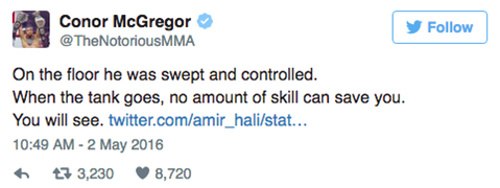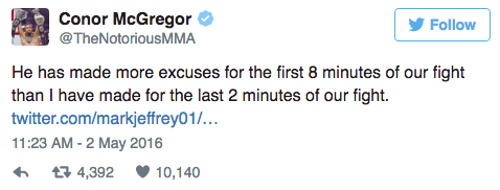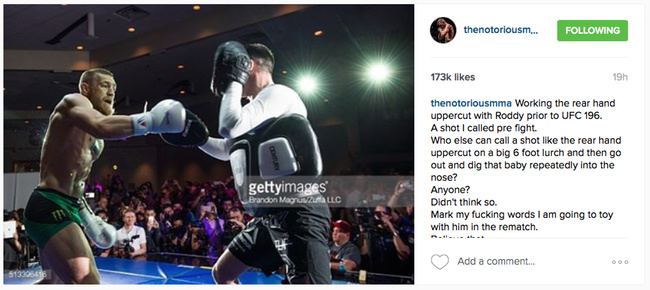Photo by Brandon Magnus/Zuffa LLC
Two weeks after Conor McGregor announced his "retirement" from MMA and the UFC dropped him from his rematch with Nate Diaz at UFC 200 in response the Irishman seems to be floating around in previously uncharted and nebulous self-promotional waters. In fact, it's been a show of self-regard, delusion, and historical revisionism not seen outside of presidential campaigns, surely not something we've ever seen in sports. Once again, for better or worse, Conor McGregor is a pioneer, treading new and unsure ground in a quest for the undivided attention of the sports world.At this point Conor's social-media strategy seems to have settled into a war on words (surprising considering his love for them), based on the suspect belief, or hope, that calling one thing its opposite enough times makes it so, that all reality is just a matter of perception. Consider the Instagram message McGregor sent out in response to the UFC stubbornly insisting on promoting UFC 200 card even without him, a card now featuring one of the most eagerly anticipated heavyweight title fights in the promotion's history:"Nobody gives a fuck about these other fights until this one is settled," McGregor wrote. "Cut the bullshit. Run it back. #RealFight"Only Conor McGregor could, with a straight face and with the angels of righteousness at his back, declare his fight with Nate Diaz unsettled and its replacement as the headliner—the long-awaited rematch between former light-heavyweight champion Jon Jones and current (but questionable) title-holder Daniel Cormier—"bullshit" and not a "real fight."And only Conor McGregor would look back at his convincing loss to Diaz at UFC 196 in March and see it as proof not of the holes in his game or the strengths in Diaz's but of his own continued and unquestionable dominance. Responding to fan criticism on Twitter Monday, for example, McGregor transmutated, as if by alchemy, his second-round rear-naked choke submission into a declaration of his own grappling eminence: Then, 30 minutes later, came an outburst that defied the universally accepted and rather reasonable fight-game adage that it doesn't really matter how thoroughly one fighter dominates another if at the end of the match the second fighter causes the first fighter to give up. This is true for all sports, and all contests of any kind: Statistics and polls and perception and points scored mean everything right up until that crucial moment when they mean nothing. Victory is the great nullifying force that wipes all slates clean. Surely no one could say differently, right?
Then, 30 minutes later, came an outburst that defied the universally accepted and rather reasonable fight-game adage that it doesn't really matter how thoroughly one fighter dominates another if at the end of the match the second fighter causes the first fighter to give up. This is true for all sports, and all contests of any kind: Statistics and polls and perception and points scored mean everything right up until that crucial moment when they mean nothing. Victory is the great nullifying force that wipes all slates clean. Surely no one could say differently, right? Yes, only Conor McGregor, of all the hundreds of professional mixed martial artists fighting for the UFC, could have conceived of and tapped into the marketing power of uninterrupted delusion, a stroke of genius in our perpetually delusional era. If nothing else, Conor's current tantrum (and that 's what it must be called because as a negotiating strategy it has proved a bust) shows that he's the very model of a modern mixed martial artist seeking attention in a media landscape that can't or won't keep its focus on any one person for more than a day. McGregor is turning historical revisionism into a strategy for perpetual relevance. Such is the power of words, turning loss into victory out of sheer will and social-media persistence.Just how far such a strategy can go remains to be seen. As much as I love Conor McGregor and his audacity, I have to hope for the sake of the species (yes hope, even on this day of Trump's Republican coronation) that there's a clear line of reality that even the most clever carnival barker/self-promoter can't blur. Thankfully, in the world of combat sports lines are defined by the most un-disguisable of realities: the hard punch to the jaw that shakes the senses. Which is just the point where McGregor's beloved social media has started to bite him back. For just as easily as he can post a message declaring himself a genius for calling the shot he believes can beat (and should have, in a reasonable world, beaten; maybe even did beat depending on how deep the delusion goes) Nate Diaz …
Yes, only Conor McGregor, of all the hundreds of professional mixed martial artists fighting for the UFC, could have conceived of and tapped into the marketing power of uninterrupted delusion, a stroke of genius in our perpetually delusional era. If nothing else, Conor's current tantrum (and that 's what it must be called because as a negotiating strategy it has proved a bust) shows that he's the very model of a modern mixed martial artist seeking attention in a media landscape that can't or won't keep its focus on any one person for more than a day. McGregor is turning historical revisionism into a strategy for perpetual relevance. Such is the power of words, turning loss into victory out of sheer will and social-media persistence.Just how far such a strategy can go remains to be seen. As much as I love Conor McGregor and his audacity, I have to hope for the sake of the species (yes hope, even on this day of Trump's Republican coronation) that there's a clear line of reality that even the most clever carnival barker/self-promoter can't blur. Thankfully, in the world of combat sports lines are defined by the most un-disguisable of realities: the hard punch to the jaw that shakes the senses. Which is just the point where McGregor's beloved social media has started to bite him back. For just as easily as he can post a message declaring himself a genius for calling the shot he believes can beat (and should have, in a reasonable world, beaten; maybe even did beat depending on how deep the delusion goes) Nate Diaz … … so too can some anonymous fan/critic/truth-defender post a gif in response showing (over and over and over, ad infinitum) Nate Diaz landing the one-two-combination that marked the beginning of the end of his fight with McGregor just at the moment McGregor was attempting the rear hand uppercut only he dared to attempt and which he assured us will one day be Diaz's end. A shot, he brags, that he called "pre-fight." So check off another unprecedented act of innovation and audacity in the career of Conor McGregor. Babe Ruth may have famously called his home run shot in the 1932 World Series, but not even the Great One would have had the temerity to retroactively call a shot that went so horribly, horribly wrong.
… so too can some anonymous fan/critic/truth-defender post a gif in response showing (over and over and over, ad infinitum) Nate Diaz landing the one-two-combination that marked the beginning of the end of his fight with McGregor just at the moment McGregor was attempting the rear hand uppercut only he dared to attempt and which he assured us will one day be Diaz's end. A shot, he brags, that he called "pre-fight." So check off another unprecedented act of innovation and audacity in the career of Conor McGregor. Babe Ruth may have famously called his home run shot in the 1932 World Series, but not even the Great One would have had the temerity to retroactively call a shot that went so horribly, horribly wrong.
Advertisement
Advertisement


